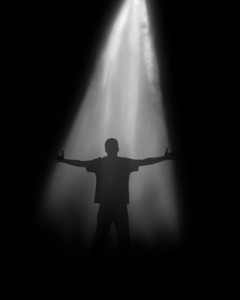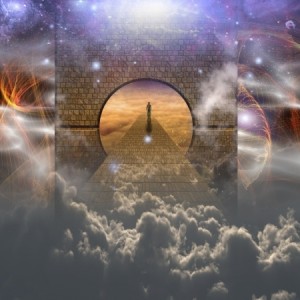The God of the Preachers

On December 11, 1934, a thirty-nine- year-old man named Bill was admitted to the hospital for the fourth time in fifteen months because of his alcoholism. As the withdrawal effects of alcohol wore away, a former drinking buddy, Ebby, came to visit. At the time, Ebby was in the midst of an extended period of abstinence. He had looked up Bill a month previously to renew their friendship and to tell him about his abstinence. Bill noticed the difference in Ebby immediately because he refused the offer of a drink. When Bill asked him what had happened, Ebby said, “I’ve got religion.”
Ebby then told Bill how he’d almost landed in prison, but had his own encounter with a few men from the Oxford Group who became sober by practicing its principles. Ebby said he gave the program a try and it worked for him. He stopped drinking. Bill wanted the sobriety Ebby had, but he couldn’t believe in the God Ebby talked about. After Ebby left his hospital room, Bill fell back into a deep depression. Ahead of him, he saw only madness and death. Science, the only god he had at the time, had declared him hopeless. Without faith or hope, he cried, “If there be a God, let Him show Himself!”
Suddenly his room was filled with a white light. He was seized with an ecstasy beyond description. Every joy he had known was pale by comparison. Then, seen in the mind’s eye, there was a mountain. I stood upon its summit, where a great wind blew. A wind, not of air, but of spirit. In great, clean strength, it blew right through me. Then came the blazing thought, “You are a free man.” . . . . “This,” I thought, “must be the great reality, the God of the preachers.” (From the A.A. conference approved book, Pass It On, pp. 111-125)
This man was Bill Wilson, one of the cofounders of Alcoholics Anonymous. As he retold this spiritual experience in the years to come, he’d add that never again did he doubt the existence of God. He also never took another drink.
When Ebby returned for another visit, he wasn’t sure what to say about Bill’s experience. Ebby himself had neither stood on a mountaintop nor had he seen a bright light when he stopped drinking. But he did give Bill a book that others suggested might help him begin making sense of his encounter with the “God of the preachers.” That book was The Varieties of Religious Experience by William James. Bill started reading it the moment Ebby left his hospital room.
Bill said he gleaned three principles from reading William James. First, spiritual experiences like his were the product of utter desperation when all human resources have failed to solve the problem. Second, this experience involved the open admission of that defeat. The person admitted his own defeat as utter and absolute. Third, there was an appeal to a “Higher Power” that could take many forms, “and it might or might not be in religious terms.” From his initial reading of James, Bill was exposed to the idea that a spiritual experience was not necessarily a religious one, that spirituality was not necessarily religion, and that a Higher Power did not have to be the God of the preachers. This distinction became a cornerstone expression of what was to become the spiritual (but pointedly not religious) program called Alcoholics Anonymous.
When Alcoholics Anonymous (the “Big Book” from which the movement took its name) was first published in 1939, chapter one told “Bill’s Story” of how he first became sober. Interestingly, he did not retell his so-called “hot flash” encounter with the God of the preachers. Bill related Ebby’s assertion that he was sober through religion, and that he’d come to pass his experience on to Bill—if Bill cared to have it. As Bill recounted his personal struggles with religion in the Big Book he wrote, “I had always believed in a Power greater than myself.” Despite the “living example” of Ebby before him, Bill said, “The word God still aroused a certain antipathy.”
Ebby suggested that Bill choose his own conception of God. The suggestion hit him hard, melting his “icy intellectual mountain” of doubts. “It was only a matter of being willing to believe in a Power greater than myself. Nothing more was required of me to make my beginning.” This ability to imagine God to be whatever an individual has imagined Him to be has remained a hallmark of the spiritual worldview of A.A. In a 1949 address before the American Psychiatric Association, Bill Wilson explicitly stated that A.A. was not a religious organization because it had no dogma. He also stated that the only theological proposition—of a Power greater than one’s self—would not be forced on anyone.
In 1961, Wilson wrote in the AA Grapevine, “Our concepts of a Higher Power and God—as we understand Him—afford everyone a nearly unlimited choice of spiritual belief and action.” He suggested that this was perhaps the most important expression to be found in the entire vocabulary of A.A. Every kind and degree of faith, together with the assurance that each person could choose his or her own version of it, opened a door “over whose threshold the unbeliever can take his first easy step into the realm of faith.” (“The Dilemma of No Faith,” AA Grapevine, April 1961. The AA Grapevine is the international journal of Alcoholics Anonymous)
This remains true today in AA. The December 2006 edition of the AA Grapevine has an article by a Muslim member of A.A. who was fearful that while sobering up, he would be “transformed into a Christian through osmosis.” He reported that nothing could have been further from the truth. “As a Muslim AA member who received a miraculous spiritual awakening in an Anglican Church basement, I am eternally grateful to the Fellowship of Alcoholics Anonymous.” (“Along Spiritual Lines,” AA Grapevine, December 2006).
When I first read of Wilson’s encounter with the “God of the preachers,” I wondered what difference it would have made if Ebby had brought Bill a copy of the Bible instead of The Varieties of Religious Experience (VRE). But now it seems to me that it would have made little difference in the eventual formulation of spiritual experience in the Twelve Steps. Although the distinction between ‘spiritual’ and ‘religious’ found in VRE seems to have been popularized within the Twelve Steps of A.A., non-alcoholics also read VRE, and the ideas they found there resonated with an emerging spiritual, but not religious sense of God and how we relate to Him.
This is the third of three related articles (What Does Religious Mean?, Spiritual not Religious Experience, The God of the Preachers) that more fully describes some of the influences I believe helped to shape the spiritual, but not religious distinction of 12 Step recovery.

